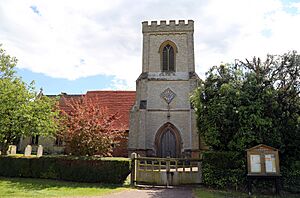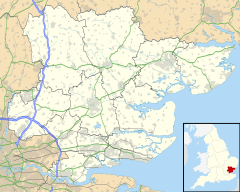Bobbingworth facts for kids
Quick facts for kids Bobbingworth |
|
|---|---|
 St Germain's Church, Bobbingworth |
|
| Population | 280 (2011) |
| OS grid reference | TL535057 |
| Civil parish |
|
| District | |
| Shire county | |
| Region | |
| Country | England |
| Sovereign state | United Kingdom |
| Post town | ONGAR |
| Postcode district | CM5 |
| Dialling code | 01277 |
| Police | Essex |
| Fire | Essex |
| Ambulance | East of England |
| EU Parliament | East of England |
| UK Parliament |
|
Bobbingworth is a small village in Essex, England. It is located in the Epping Forest area. The village is about 3 kilometers (2 miles) north-west of Chipping Ongar. It is also about 16 kilometers (10 miles) west of Chelmsford, which is the main town of Essex. Bobbingworth is part of the Brentwood & Ongar area for government elections.
Bobbingworth is a civil parish. This means it is a local area with its own council that manages some local services. According to the 2011 Census, about 280 people lived in Bobbingworth. The village covers an area of about 10.5 square kilometers (2,595 acres).
Contents
Blake Hall: A Historic Building
A very important building in Bobbingworth is Blake Hall. This historic house played a special role during the Second World War. In September 1940, the nearby North Weald Aerodrome was bombed. After this, Blake Hall became the main headquarters for the Royal Air Force (RAF) station.
There was also a train station called Blake Hall tube station. It was named after the building and was located south of the village. This station is now closed.
Bobbingworth School: A Look Back in Time
The School's Early Days
Bobbingworth School and the house where the teacher lived were built in 1855-1856. The Capel Cure family, who owned Blake Hall, built them. They wanted a "good substantial schoolroom" for the children in the area. Until 1869, only girls attended this school.
Growing Student Numbers
By 1871, the school started to include boys, with 18 boys joining the girls. This change might have happened because of new rules from the Education Act. An inspector visited the school that same year. He reported that 55 places were available, which was more than enough for the 47 children who needed schooling in the parish.
Support and Changes Over Time
The Capel Cure family continued to support the school until 1904. They did this without getting money from public funds. The school remained their property but was run as a Church school. In 1896, another inspector visited. He found the buildings were in good condition, but the school's academic standards were not very high. The school officially came under the control of the Essex Education Committee about three years after the 1902 Education Act.
 | George Robert Carruthers |
 | Patricia Bath |
 | Jan Ernst Matzeliger |
 | Alexander Miles |


